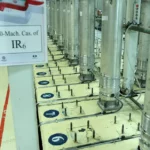The European Union (EU) offered Tunisia a “strengthened partnership” on Sunday, accompanied by financial aid exceeding one billion euros, without mentioning conditions for its support for this country, strangled by debts and faced with a migration crisis.
“It is in our common interest to strengthen our relationship and to invest in stability and prosperity, that is why we are here”, declared the President of the European Commission Ursula von der Leyen, who came to Tunis in company of the Prime Ministers of Italy, Giorgia Meloni, and of the Netherlands, Mark Rutte.
After an interview with President Kais Saied, the official announced Brussels’ intention to provide the country with long-term aid, “macro-financial assistance which could reach 900 million euros”. In addition, Brussels “could provide additional aid of 150 million euros to be injected into the budget now”, added Ms von der Leyen. This aid is part of a “five-point package” which Ms. von der Leyen hopes will be the subject of a bilateral agreement by the end of June and the next European summit.
Recalling that the EU is the “first trading partner and first investor” in Tunisia, she noted that Europe has “supported Tunisia’s path to democracy since 2011 (and the Revolution that overthrew dictator Zine El Abidine Ben Ali, editor’s note), a long and difficult road”. “Difficulties that can be overcome,” said the European leader, without mentioning the current political crisis that is shaking the country.
President Saied, who granted himself full power in the summer of 2021, is accused of “authoritarian drift” and of having reduced rights and freedoms by the opposition and NGOs. Since the beginning of February, around twenty opponents have been imprisoned on charges of “conspiracy against state security”. According to Amnesty International, they are the subject of “a witch hunt”.
“Bargaining”
Europe has not hidden its concern for the Maghreb country in recent months, its head of diplomacy Josep Borrell even evoking a “risk of collapse”. Tunisia is strangled by a debt of 80% of its GDP and can no longer borrow abroad, which leads to recurring shortages of foodstuffs, such as flour, sugar and rice, purchased by the State.
It has been negotiating for months a new loan from the International Monetary Fund (IMF) but the discussions have stalled over President Saied’s refusal of reforms including a restructuring of the hundred or so heavily indebted public companies and the lifting of certain state subsidies on the products of base.
The program proposed by the EU on Sunday provides for increased investment in Tunisia, particularly in digital technology and renewable energies, as well as an extension to Tunisia of the European student exchange program Erasmus, with an envelope of 10 million euros. One of the important aspects of the European “package” concerns the fight against the “cynical business” of illegal immigration, for which the EU will provide “this year to Tunisia 100 million euros for the control of its borders, search and rescue” of migrants, said Ms von der Leyen.
Ms. Meloni, for whom it was the second trip in five days to Tunisia, said she was “satisfied” with the European approach which offers “a real partnership to face the migratory crisis and the question of development” in Tunisia. Italy, whose coasts are less than 150 km from the southern shore of the Mediterranean, is worried about a further acceleration in the arrival of migrants from Tunisia. Ms. Meloni said she discussed with Mr. Saied “the forthcoming holding of an international conference on migration” in Rome.
According to the latest UNHCR statistics, 51,215 migrants have arrived illegally by sea in Italy since the start of the year (+154% over one year), including more than 26,000 from Tunisia, the rest from Libya. Nearly a thousand died or disappeared at sea in shipwrecks. The Forum for Economic and Social Rights (FTDES), a Tunisian NGO, denounced in a statement on Sunday the European visit as “a bargain” to “give money” to Tunisia in exchange for reinforced surveillance of its borders.
This article is originally published on lorientlejour.com









